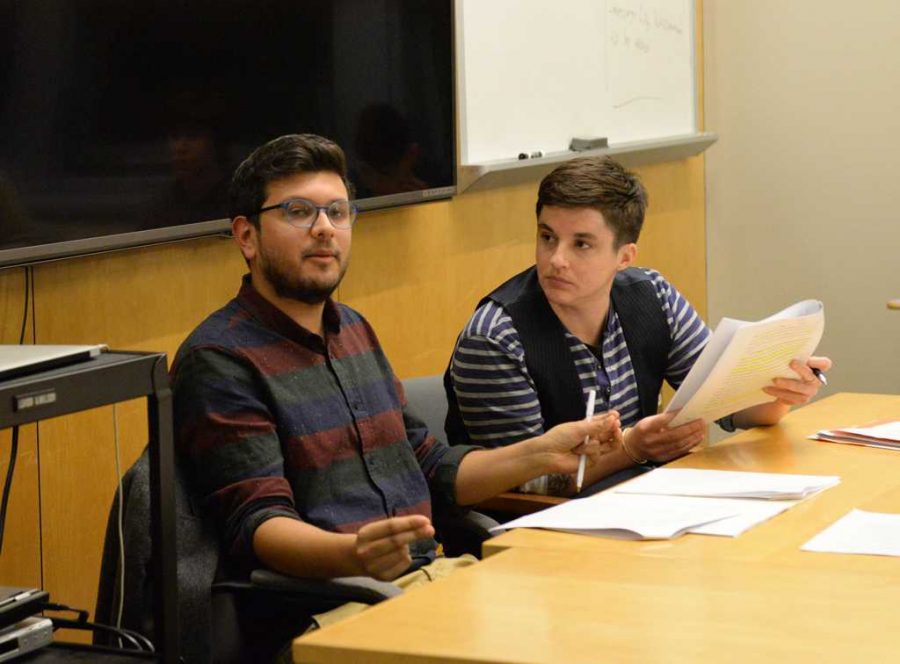It’s too far past add/drop to get a seat in Pitt’s first transgender studies course, but there wouldn’t be room for newcomers anyway.
As soon as Pitt’s Gender, Sexuality and Women’s Studies announced Special Topics: Transgender Studies, 25 students rushed to fill all of the open seats.
The Monday evening gender, sexuality and women’s studies course is the first undergraduate course about transgender populations at Pitt and is taught by visiting lecturer Julie Beaulieu teaches, this spring. Pitt is currently interviewing instructors who specialize in sexuality studies in hopes of offering the course regularly.
Beaulieu, who specializes in women in literature, feminist theory and gender and sexuality, said the new course aims to give students an in-depth understanding of the trans perspective, including the various gender identities under the umbrella of being transgender. Other ACC schools, such as Syracuse and Duke Universities, offer similar courses in transgender studies.
“Some people identify as non-binary, some as trans and some are still seeking language to explain [their] unique experience with gender,” Beaulieu said.
The course focuses on the progression of trans lives and how that change has impacted society throughout history. Specific topics include the medical history of trans lives, early trans activism, history of trans theory and key debates in feminist and queer theory that impact trans lives.
“Some [students] are taking the course out of personal interest, some want to deepen their understanding of critical theories of embodiment and some [think this] will help them to better serve people in health care and other fields,” Beaulieu said.
Natalie Shafer, a senior GSWS, history and philosophy major and a student in the class, said the course rejects misrepresentations of trans people in the media by educating the students about theory, rights and history relating to the identity.
Shafer said she took the class to gain an understanding of life as a trans person in the United States.
“[The public’s knowledge is] gathered from the little media coverage transgendered people get, normally of which doesn’t include or misrepresents the actual experience of trans people,” Shafer said.
Beaulieu said she hopes to teach more trans studies courses in order to help students get a more comprehensive look at transgender identities, including branching out into more specialized topics, like trans literature.
“I hope to teach a course on transgender art, literature and film in the future,” Beaulieu said. “There’s a rich archive of trans literature and art that is really moving and transformative.”
For Alexander McCarthy, a senior urban studies major, the course is something he’s been waiting for since he started taking classes with Beaulieu.
“I’ve had Julie for a bunch of classes, and [GSWS has] been saying for several semesters that this class might be offered,” McCarthy said. “Within gender studies, my trans topics are my favorite, probably because I’m trans, and I knew Julie’s class would be heavy in theory which I also love.”
McCarthy said the Pitt GSWS classes he’s taken have helped him shape his understanding of how the world sees transgender people.
Todd Reeser, program director for GSWS, said he wants Beaulieu’s students to apply what they have learned beyond the in-class discussions of each week’s lecture.
“Transgender is an increasingly visible form of gender identity, and if students are to function in [this] increasingly diverse world, they should have a grasp on this topic,” Reeser said.
Reeser, who teaches an integrated Queer Theory graduate class that integrates trans studies, has published several articles on trans identities in French literature and film. Reeser said the GSWS has also never offered a stand-alone trans studies class on the graduate class. He said studying transgender culture and identities is especially important for the transgender population at Pitt.
“Trans students at Pitt should also have the opportunity to consider their own relation to trans studies and to evaluate some of the work that has been published,” Reeser said.
“GSWS is very pleased to be able to make such important contributions to campus diversity,” Reeser said. “We consider ourselves a key player in Pitt’s commitment to diversity in all areas of student life.”
For McCarthy, the department’s classes — including Beaulieu’s new course — have helped him subvert existing gender binaries and acknowledge how the world sees trans people.
“In my four years taking these classes, I’ve come to interpret our gendered world with a more critical eye,” McCarthy said. “[The courses] help take what we learn in the classroom in theory into the outside world to inspire social change.”


